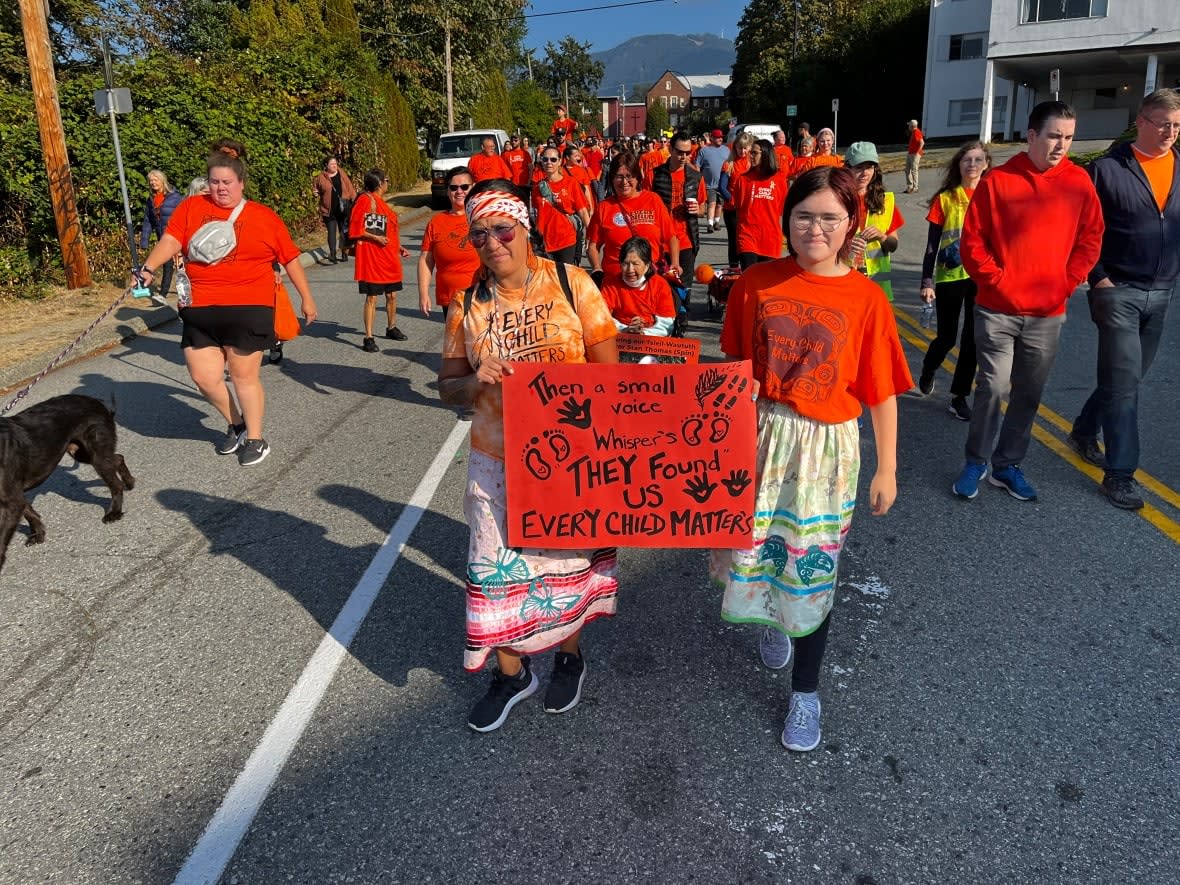National Day for Truth and Reconciliation to become a statutory holiday in B.C.

The National Day for Truth and Reconciliation is set to become a statutory holiday in B.C., the government announced Tuesday.
Sept. 30 is already a federal holiday, meaning that workers in federally regulated industries are entitled to a day off with pay. A bill introduced in the legislature Tuesday by Labour Minister Harry Bains will make it a provincial one as well.
Bains said the holiday will be observed in B.C. beginning in September 2023.
The holiday was first observed federally in 2021, on a date chosen to coincide with Orange Shirt Day, named to commemorate a story told by Phyllis Webstad, whose prized orange shirt was taken from her on her first day at St. Joseph Mission Residential School near Williams Lake.
Webstad appeared at a press conference Tuesday alongside government ministers announcing the new provincial holiday.
"There is no longer an excuse for anybody, no matter what age, to not know what happened to us," she said.
Eddy Charlie, a survivor of the Kuper Island Residential School off the east coast of Vancouver Island, described the residential school system as "one of the most horrific hate machines ever" during Tuesday's press conference.
He said the abuse and deprivation experienced by survivors caused many to become "monsters," passing on their trauma to loved ones through violence and substance abuse.
"Today, 50 years after I left residential school, I still wake up every day with remembrance of what happened to me as a child," he said.
The statutory holiday is a result of a call to action from the Truth and Reconciliation Commission, which asked the federal government to establish a day to honour residential school survivors, their families and communities.
If the legislation passes as expected, B.C. will join Prince Edward Island, the Northwest Territories, Nunavut and Yukon in designating Sept. 30 as a statutory holiday.
Bains said the B.C. law honours the strength and resilience of residential school survivors and remembers the children who never came home.
How Truth and Reconciliation Day is marked across Canada
In neighbouring Alberta, the province has left it up to employers to implement Sept. 30 as an optional holiday. A spokesman with Indigenous Relations, Ted Bauer, says the province has chosen to commemorate the day through education and action, as work is being done to create a residential school monument and garden.
A bill declaring National Truth and Reconciliation Day as a statutory holiday in Yukon was unanimously approved by the territory's legislature in November. Bill sponsor Annie Blake said the holiday was to ensure everyone in the territory can reflect on the "shared history of colonialism and commemorate the legacy of residential schools.''
The government of the Northwest Territories added Sept. 30 to the list of statutory holidays last year, in what the Education Ministry said was "a significant step toward reconciliation.''
The provincial government in Saskatchewan said last year it was not considering additional statutory holidays at this time. Matthew Glover, director of media relations with the government, said Sept. 30 would continue to be an important day for reflection, recognition and an opportunity for all citizens to learn more about the legacy of residential schools.
In September, the Manitoba government said discussions continue about making Sept. 30 a statutory holiday. Schools and non-essential government services are closed for the day.
Nunavut announced last year that changes had been made to the Labour Standards Act, Legislation Act and Public Service Act to make the day a statutory holiday, which applies to public service employees and those with territorially regulated businesses.
Sept. 30 is not a statutory holiday in Ontario. Schools remain open and operate as usual. Erika Robson, a spokesperson for Indigenous Affairs Minister Greg Rickford, said in September the day was for schools, workplaces and communities to honour those affected by the legacy of residential school policies, similar to how Remembrance Day is observed across the province.
Similarly, the day is not a statutory holiday in Quebec. In 2021, the government said it had no plans to make it one.
In New Brunswick, Sept. 30 was declared a provincial holiday last year. Premier Blaine Higgs urged New Brunswick residents "to pause and reflect upon what we can do as individuals to advance reconciliation.'' The holiday is optional for private sector businesses.
The government of Newfoundland and Labrador said last year that consultations continued with Indigenous governments and organizations and the business and labour sector about making the day a public holiday under the Labour Standards Act. Provincial government offices, schools and other entities close for the day, while the province encourages businesses and other organizations to commemorate the day.
Nova Scotia provincial government offices, public schools, regulated child-care and other non-essential public services are closed on Sept. 30. Businesses have the choice to remain open. The day is not a general paid holiday.
P.E.I. announced in 2021 it would recognize the day as one of eight paid holidays in the province under the Employment Standards Act. Provincial government offices and schools are closed.


